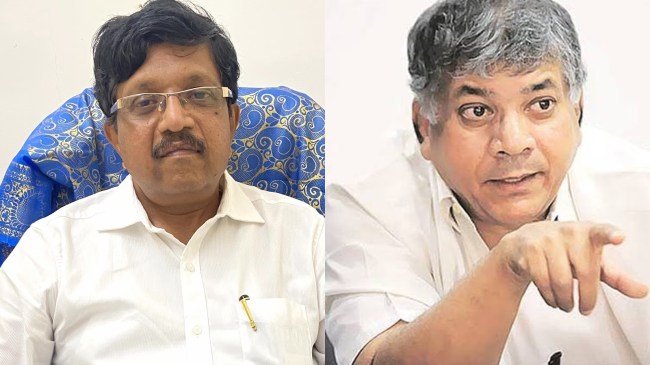Opinion Dynasty and division: The crisis in Dalit politics in Maharashtra
As hereditary leadership and ideological contradictions reshape mobilisation, Ambedkar’s legacy is under strain
 Both Prakash and Anandraj Ambedkar have used their surname to claim moral and political authority, particularly among Neo-Buddhists and Mahar communities.
Both Prakash and Anandraj Ambedkar have used their surname to claim moral and political authority, particularly among Neo-Buddhists and Mahar communities. Written by Upendra Sonpimple
Dalit politics in Maharashtra is undergoing a crisis of identity and leadership, marked by internal divisions and dynastic claims. At the centre of this conflict are two grandsons of B R Ambedkar — Prakash Ambedkar, leader of the Vanchit Bahujan Aghadi (VBA), and Anandraj Ambedkar, head of the Republican Sena. Both claim to be the true torchbearers of Ambedkar’s ideology, yet their rivalry and political strategies raise critical questions about the future of Dalit leadership.
The situation intensified when Anandraj Ambedkar’s faction of the Republican Party of India (RPI) allied with Eknath Shinde’s Shiv Sena for the upcoming local elections. This alliance, framed as a union of “Shiv Shakti and Bhim Shakti”, was seen by many as a betrayal of Ambedkarite principles. Ambedkar had openly opposed Hindu right-wing organisations like the RSS and Hindu Mahasabha, making such partnerships ideologically contradictory.
This political manoeuvring reveals a deeper issue: The increasing reliance on hereditary legitimacy in Dalit politics. Both Prakash and Anandraj Ambedkar have used their surname to claim moral and political authority, particularly among Neo-Buddhists and Mahar communities. This approach contradicts Ambedkar’s own rejection of dynastic rule. As he once stated, “What is more important, the right of the prince or the welfare of the people?… Even the best friends of the States will not say that the welfare of the people should be sacrificed for the sake of maintaining the rights of the prince.”
Ambedkar’s vision was rooted in democratic and rational leadership, not bloodline. He did not appoint his own son, Yashwant, as his political successor. Instead, he left the leadership of the Scheduled Castes Federation open to capable followers, regardless of lineage. Yet today, Dalit politics in Maharashtra often promotes the idea that only Ambedkar’s descendants can lead, sidelining emerging voices from non-Ambedkar descendants.
The VBA, for instance, has campaigned on the notion of “pure Dalit leadership”, implying that non-Ambedkar descendants are self-serving or corrupt. This rhetoric not only undermines democratic values but also mirrors the logic of caste, where hereditary superiority justifies power and dominance.This raises urgent questions: Does dynastic politics threaten the emergence of new Dalit leadership? Is the movement shifting from ideological mobilisation to emotional loyalty? Can hereditary politics effectively challenge Brahminical dominance, or does it replicate its structure?
Historically, the Dalit movement in Maharashtra drew strength from anti-caste rationalism, beginning with Mahatma Phule’s Satyashodhak Movement and culminating in Ambedkar’s fight against untouchability and caste oppression. Today, however, dynastic politics risks undermining this legacy. Even among Mangs, there is a search for descendants of Annabhau Sathe to lead, reinforcing hereditary rather than ideological commitment.
Moreover, Ambedkar descendants/ leaders have increasingly adopted soft-Hindutva and loose secularism, visiting Hindu and Muslim religious sites to gain broader support. The VBA’s past alliance with Uddhav Thackeray’s Shiv Sena exemplifies this trend, raising concerns about ideological dilution. If alliances are formed without ideological clarity, can claims of bloodline purity hold any moral ground?
This shift mirrors the caste system’s logic, where hereditary superiority justifies power. In politics, such logic suppresses democratic participation and stifles dissent. The master-slave dynamic — where followers are emotionally bound to dynastic leaders — creates psychological dependency, limiting the scope for revolt or alternative leadership.
The Dalit movement in Maharashtra is already experiencing political demobilisation. If dynastic politics continues to dominate, it may extinguish the space for critical thinking, grassroots mobilisation, and ideological unity. Dalit leadership must become more radical and inclusive, breaking free from caste-based patronage and fostering a community that is politically active and ideologically grounded.
At the national level, Mayawati’s succession planning within BSP — passing leadership to her nephew — also reflects dynastic tendencies. However, in Maharashtra, the narrative of “pure blood” creates a false consciousness, distancing Dalits from their ideological roots and weakening the movement’s transformative potential.
The emotional outrage surrounding hereditary leadership is anti-Dalit, anti-Ambedkarite, and anti-democratic. It suppresses the rise of new voices and creates a culture of obedience rather than critical engagement. If this trend continues, it could lead to the ideological erosion and eventual stagnation of the Dalit movement.
To revive the movement, Dalit politics must return to its rational, anti-caste, and democratic foundations. Leadership should be based on commitment, capability, and ideological clarity — not lineage. Only then can the movement reclaim its transformative potential and truly honor the legacy of Ambedkar and Phule.
The writer is a social justice and caste discourse scholar at University of Edinburgh, Scotland, UK





